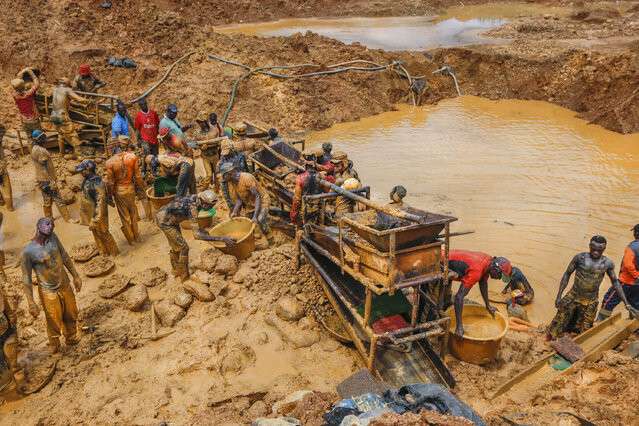Nana Yaw Barima Barneh, Communications Manager for Ghana Water Company Limited in the Western and Central regions, warned that the continued destruction of river bodies through galamsey activities is a suicidal approach.
He noted that this may ultimately compel the government to resort to importing bottled water, a financially impractical solution.
According to Nana Yaw Barima Barneh, the poor state of Ghana’s water bodies has severely impacted the country’s ability to extract sufficient water for treatment, as exemplified by the recent situation in Cape Coast, where the amount of water available for treatment has plummeted by a staggering 75%
He bemoaned the fact that Ghanaians are facing difficulties in accessing potable water, a situation that is tragic of their own making, caused by the harmful activities of individuals within the country.
“We have allowed them [illegal miners]. Everybody in Ghana knows that the coagulant we have used over the years has been aluminum sulfate but because of the deterioration of the quality of the Pra River, we are unable to use alum anymore”.
“So we have had to go in for another coagulant called polyelectrolyte. The cost of polyelectrolytes is four times more expensive than alum. This tells you that, GWCL is spending four times more than the cost of treatment in getting treatment chemicals”.
Nana Yaw Barima Barneh
Barneh revealed that the water quality has deteriorated alarmingly, as evidenced by the Pra River’s turbidity level, which has skyrocketed to 14,000 NTU, a staggering seven-fold increase from the acceptable level of 2,000 NTU.
He noted that the GWCL faces a considerable challenge and expense in having to bring down the turbidity level from a remarkably high 14,000 NTU to a mere 5 NTU, making the water safe for consumers.
Barneh pointed out that the sand and sediment resulting from galamsey activities often accumulate at the intake points of the water treatment plants, causing obstacles and hindering the ability to extract water for treatment.
He acknowledged that closing the plants would be the optimal course of action, but he cautioned that this would worsen the water shortage, and therefore, he urged galamsey operators to halt their operations.
GWCL Urges Public To Report Galamsey Operators
Furthermore, Nana Yaw Barima Barneh further emphasized that the Ghana Water Company Limited (GWCL) is appealing to the general public to report any galamsey operators to them, enabling the company to take swift and appropriate action against these individuals.

Barneh expressed his dismay that the country and its citizens are passively tolerating the devastating effects of galamsey, despite being fully aware of its dire consequences on human life and the environment, which he deemed a shameful state of affairs.
He expressed concern that citizens are showing a lack of concern about the fact that their water supply is being poisoned, leaving the GWCL to deal with the challenging and costly process of treating water that has been degraded to a muddy state.
“Not too long ago, the Minister for Sanitation and Water Resources came and inaugurated some speed boats. We have arranged with the Police Commander in the Western region to deploy some men on the Pra River. If we can get either one or two of these boats, we will be able to, at least, drive them [galamsey operators] away”.
“The regional Police Commander us given us assurance that once we are able to get the equipment they are demanding, they will be able to do the operation”.
Nana Yaw Barima Barneh
Barneh pointed out that a recent exercise in March at Dabuase showed that the presence of police can be a powerful deterrent, as illegal miners fled the Pra River upon seeing the authorities, demonstrating the potential for policing to help protect water sources from galamsey.
He noted that the police operation led to a dramatic improvement in the River’s water clarity, with turbidity levels dropping by a remarkable 10,000 NTU, from 14,000 NTU to 4,000 NTU, showcasing the effectiveness of targeted interventions.
Barneh emphasized that GWCL’s hands are tied, and it cannot promise a normalization of water supply services anytime soon, since the company is at the mercy of the severely degraded water quality, which is a direct result of galamsey activities and outside of GWCL’s control.




















